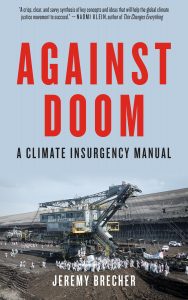By Nick Kuzmack
NixBeat
July 18th 2017
If humanity is to have a future, it needs a strategy to combat the threat of climate change. The threat of climate change is overwhelming and even now we are only beginning to grasp its effects on our fragile world. Before the election of President Trump, it seemed that humanity was willfully strolling its way to a climate catastrophe.
Although agreements such as the Paris Climate Agreement offer loose frameworks to transition to a fossil fuel free civilization, this historic agreement falls short of a binding resolution. Admittingly, it’s a vocal show that the world is waking up to its greatest challenge, but the agreement is vague in its promise to stall the rising of world temperatures to and over 2C from pre-industrial revolution levels and certain climate catastrophe. Now, after the election, and the United States recent withdrawal from the Paris Climate Agreement, it seems our future is on the brink of disaster. In his new book Against Doom, author Jeremy Brecher provides the outline for a strategy to move forward.
Against Doom is sort of a manifesto. It covers a wide arrange of ideas and is broken up into two sections: The first highlights a growing global insurgency against forces that seek to cause climate catastrophe. While the second outlines bold struggles to combat the threat of climate change. Brecher discusses examples of resistance that spans the world, the shortcomings of the Paris Climate Agreement and the importance of grassroots people power against the fossil fuel industry. One example Brecher highlights are the protests led by low-income, predominately African-American residents in Albany, New York, against the highly volatile “bomb trains” (fuel trains) that run through their neighborhoods. In this Brecher provides an analysis on this community’s grassroots, non-violent resistance—specifically community outreach, and mutual support and civil disobedience— toward inconveniencing the fossil fuel industry in their neighborhood.
The second section of Against Doom, Brecher proposes bold strategies to tackle climate change. This includes a fossil fuel freeze which implements a halt on all new fossil fuel infrastructures, plans to turn public opinion against the fossil fuel industry and challenging hopelessness with action. One of Brecher’s proposals is to utilize existing political forces to erode and ultimately challenge the legality of continuously using fossil fuels. He touches on an idea called the “Public Trust’—a proposal where the world, its resources and its wonders belong to humanity as a whole and not just a select few. Brecher backs this argument with examples of disobedience and legal challenges that have been won and subsequently put a check on the fossil fuel industry. Although, Brecher points out some success, he emphasizes that those wishing to conduct direct action should be prepared for the consequences—for better or worse.
In Against Doom, Brecher ties complex strategies for a just transition to a sustainable civilization that seeks broad cooperation from diverse organizations and groups. This book is a great read, alongside other works that dive deeper into the roots behind ecological injustice and climate change. Brecher stresses the importance of the responsibility of change at the feet of the people, not the government’s.
The ideas proposed emphasis a peaceful resistance against the fossil fuel industry. I wonder how long a peaceful resistance can hold out against the imposing super structure of the fossil fuel industry. That being said, Against Doom does not promise or outline an easy fix. Make no mistake, the odds stacked against doom are incredible. They are not, however, impossible to overcome. Brecher provides an analysis of growing awareness toward climate change and, in some cases, a willingness to act for a just future across the board.
Hopefully if these—and other— solutions
are carried out, humanity will likely see a globally strong force of
climate warriors, who will guide our species away from certain disaster.
Though these methods of transition reveal that humanity will witness
drastic changes and possible losses, to much of what we take for
granted, if these solutions are carefully acted upon, we may still see a
brighter tomorrow and a world worthy of being rebuilt and cared for by
our fragile species. Consider Against Doom as a supplementary guide, filled with hope, to that future.






